MORGANTOWN — West Virginia Auditor J.B. McCuskey is looking to preempt multi-million dollar headaches regarding misappropriated COVID-19 relief funds by requiring cities to get on board with Project Mountaineer, the state’s integrated accounting program that links local governments with the state office responsible for auditing them.
Those audits are fixing to get a lot more complicated, McCuskey told members of Morgantown City Council on Tuesday, pointing to the $10.65 million anticipated for Morgantown as part of the American Rescue Plan relief package.
“What we’re trying to avoid is a litany of very expensive consultants and lawyers descending upon our towns and counties explaining to them, ‘Hey, for 10% of your American Rescue Fund funds we can help you spend it properly.’” McCuskey “Our office is fully equipped to make those decisions to help you so you can spend the money that you will receive on the things that you want to spend it on.”
McCuskey said each city will receive a special revenue account for the funds as well as a form that will be used with that city’s online checkbook site to track those dollars.
“What our office is trying to make sure is available to you is all the resources to find out what you’re allowed to spend the money on as well as all the resources we need to track this money and make sure all the reporting that needs to be done to the federal government is being done in an appropriate way so none of this money gets clawed back in the future,” he said.
Westover ($1.74 million), Granville ($1.31 million), Star City ($810,000) and Blacksville ($70,000) are also part of the $677 million in funding for West Virginia’s cities and counties as part of the rescue plan.
Monongalia County, which became the first county in the state to embrace McCuskey’s Project Mountaineer in August of 2018, will receive $20.48 million in relief aid.
In other city news, changes to city ordinances pertaining to sidewalks will be heading before council in the coming weeks.
Included in those amendments would an elimination of the all-or-nothing method by which sidewalks are handled.
Currently, if you’re building a home or development, code dictates you build a sidewalk unless the city permits you a waiver — and there have been a lot of waivers granted — roughly 185, resulting in just under five miles of non existent sidewalks according to the city’s engineering office.
Under the amended ordinance, being granted a waiver would still require the property owner to place 50% of the estimated cost of the sidewalk construction in a city sidewalk fund.
According to information provided Tuesday, conservatively, the city needs 20 miles worth of sidewalk construction.
With sidewalks costing between $500,000 and $1 million per mile, City Manager Kim Haws said this fund my help, but it certainly won’t get the city fully connected.
“This is going to require a pretty aggressive approach,” Haws said. “If we really are serious about starting to implement in a real way this plan, then I would suggest you give some direction to administration to begin looking at funding strategies that could be brought back to council … So this doesn’t get put back on the shelf like it has throughout the years.”
Lastly, council,
- Opted to take up an ordinance amending Article 153 regarding the Human Rights Commission to prohibit discrimination based on natural hair.
- Will consider a zoning reclassification of 20 Scott Avenue, the property formerly a Ramada Inn that’s being transformed into a hub for social services, including a new sobering center.The reclassification would make the property B5 (shopping center), though council asked city administration to look into whether that classification would be most appropriate. While council previously voted to annex that property into the city, that process has never been finalized.




